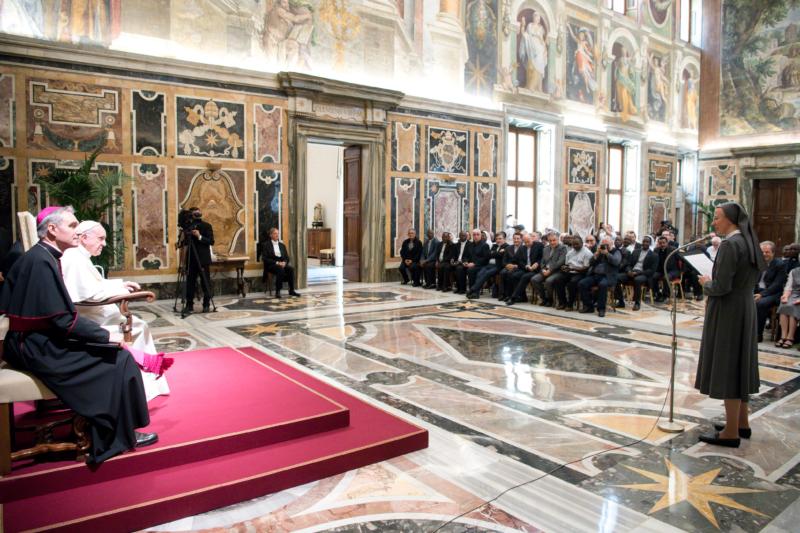By Christopher White, The Tablet’s National Correspondent

ROME – Ahead of Thursday’s kickoff for Pope Francis’s closely-watched summit on sex abuse, major superiors of Religious Orders and Congregations around the world have called the abuse of children “wrong anywhere and anytime” and urged greater involvement of women in reform efforts going forward.
Noting that the work of religious orders and congregations puts members on the front lines of abuse in a wide range of situations, their statement released Tuesday aims to highlight the particular vulnerabilities of children.
Although the statement comes from religious superiors, it was distributed by the Vatican Press Office.
“In our work as religious, we come across many situations where children are abused, neglected, maltreated and unwanted. We see child soldiers; the trafficking of minors; the sexual abuse of minors; the physical and emotional abuse of minors. They cry out to us,” the superiors write.
“Children are the most vulnerable in our societies. Children who are poor, who are disabled or destitute, or who are on the margins, who belong to lower social classes or castes may have a particular vulnerability. They are considered dispensable, to be used and abused,” the statement continues.
The context for this week’s Vatican meeting is the result of “a story stretching back for decades, a narrative of immense pain for those who have suffered this abuse,” according to the statement.
“We bow our heads in shame at the realization that such abuse has taken place in our congregations and orders, and in our Church,” the statement continues. “We have learned that those who abuse deliberately hide their actions and are manipulative. By definition, it is difficult to uncover this abuse. Our shame is increased by our own lack of realization of what has been happening.”
“The abuse of children is wrong anywhere and anytime: this point is not negotiable,” they write.
In the days ahead, the superiors said that their shared hope is that “important processes and structures of accountability can be started and the ones already in place can be supported.”
The statement also issues a broader call to action for a new culture within the Church where safeguarding children is a paramount concern, in a range of areas, including healthcare, education, formation, and spiritual care.
Pope Francis’s efforts to resist clericalism are also echoed in the statement, with a commitment to “engage in a journey with those we serve, moving forward with transparency and trust, honesty and sincere repentance.”
“We want to see our blind spots. We want to name any abuse of power,” they write.
In addition, they issue a plea for the involvement of parents, and particularly women, in the fight against sexual abuse.
“It is fair to say that if women had been asked for their advice and assistance in the evaluation of cases, stronger, faster and more effective action would have been taken. Our ways of handling allegations would have been different, and victims and their families would have been spared a great deal of suffering,” they write.
The statement concludes with a message directly to survivors and their families, with an apology for “an inadequate attempt to deal with this issue and a shameful lack of capacity to understand your pain.”
“We invite you to work with us to put in place new structures to ensure that the risks are minimized,” they write.
“We commit our efforts to working with him so that the Church can move forward in a coherent, credible and unified way, a way that is genuinely healing, truly renewed, with new eyes to see and new ears to hear,” they conclude.
The meeting of presidents from bishops’ conferences around the world will commence on Thursday at the Vatican, and it will include twelve heads of male religious orders and ten from female religious orders.
The three-day meeting will focus on responsibility, accountability and transparency, and will open and close with remarks from Francis.
